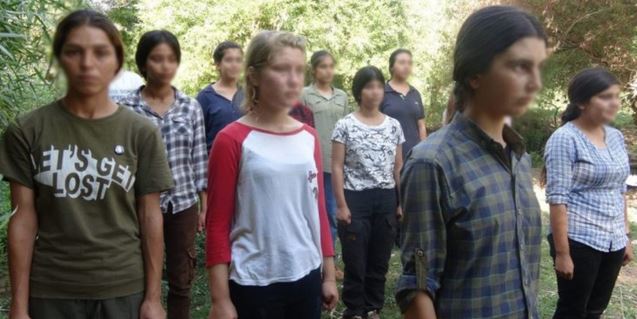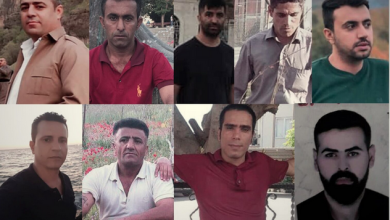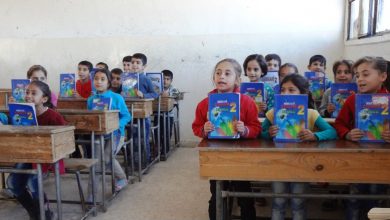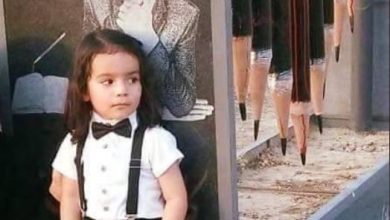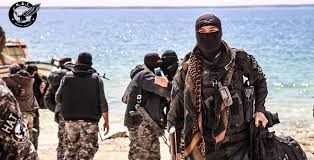For many years, the topic of using children as a tool in regional wars in the world and especially in the Middle East has been of great interest.
According to the reports published by the United Nations, many cases of the use of children in armed conflicts in regions such as Kurdistan and other regions in the Middle East have been proven, a trend that has gained more momentum in recent years.
The use of child soldiers is a serious violation of human rights, which is prohibited under international law, but this issue is still used by many political groups and parties in the Middle East and has been rejected by them in many cases; Meanwhile, by examining the reports and images published by Kurdish groups and parties in the Middle East and the media affiliated with the PKK, YPG in Turkey, as well as Iranian Kurdish parties such as PJAK and Demokrat, a large number of girls and boys are Broadcasting advertisements or fighting in the ranks of groups.
This analysis seeks to establish an international legal framework on child soldiers employed by groups, organizations, parties and political branches and examines why these children are used and how to end their use. considered by these organizations.
International legal framework
According to the 1949 Geneva Convention on the Protection of Civilian Persons, the employment of child soldiers in conflicts is prohibited
The Convention and its Additional Protocols prohibit the use of children under the age of 15 as soldiers, which has been defined by the International Criminal Court as a war crime.
Paragraph 3 of Article 38 of Additional Protocol No. 2 stipulates that “children under the age of 15 shall never be recruited into armed forces or groups, nor shall they be allowed to participate in hostilities.”
In addition, the United Nations Convention on the Rights of the Child and its Optional Protocol prohibit the participation of children in warfare.
These conventions are mostly related to states and do not cover armed groups and terrorist organizations. However, these conventions provide a framework for individual and state responsibility under international law.
They do not preclude the obligation of States parties to these conventions, nor the responsibility of their individuals. In this regard, it is necessary to understand why the groups and parties mentioned earlier use child soldiers and how other States may prevent them. Focus on using tools to help children in their activities.
Why do they use child soldiers?
Leaders and secretaries of blind political parties and groups in Kurdistan, despite knowing very well that international laws prohibit the employment and use of children under the age of 15 and their participation in terrorist activities, still prefer this violation for three reasons. continue
- Children are used as a last resort by a terrorist groups when they have no other means of support in terms of manpower.
For example, God’s Resistance Army in Uganda, Revolutionary Armed Forces in Colombia, Boko Haram in Nigeria, PKK and YPG in Syria and Iraq, PJAK and the Kurdistan Democratic Party (both branches) in Iran all more when their power to maintain the conflict, children are abused while some children serve as porters, porters, guards or cleaners, others carry weapons and by holding them They exercise power over their peers or people who may be years older than them and commit crimes against them in the same way.
Even Nazi Germany in the last months of the war, when Germany was being conquered and destroyed; Hitler put 15-year-old youths on the battlefield, therefore, the forced use of these groups of child soldiers indicates a serious loss and fall of human resources, which will be a very fatal risk for these groups to lose their status, and this It requires them to kidnap children or attract them with various promises and exploit these children.
- The targeting of child soldiers by a legitimate armed force raises ethical and legal questions
Some believe that the deliberate targeting of child soldiers, as opposed to adult combatants or terrorists, is morally wrong. However, the law does not provide such a privilege for children who are directly involved in the conflict.
Who should be held accountable?
To respond effectively to the problem of child soldiers, the international community needs to create a political and legal mechanism.
In the political dimension, these groups and parties should prevent any kind of propaganda that can make their behavior as a heroization of these children by putting pressure on them and reach to minors, and this kind of On the legal side, governments must be held accountable by prioritizing those they employ within their domestic legal systems.
The dominant image of this group in the foreign media is that these groups and parties are “a revolutionary group and fight for democracy”.
One of the biggest mistakes that the media has made by deliberately covering some of the activities of these groups is that their faces have been purified and they are referred to as a means of transition from dictatorship to democracy, and in fact “the forces of are “legal egos” that have been a great help in preventing the spread of dictatorship as much as possible.
The fact is that these groups have long been motivated to realize their separatist dreams inside Turkey, Syria and Iran, and for this purpose, they even force children to join their ranks and kidnap them if they don’t want to and use all kinds of threats. They force you to do what you want; So in short, governments and media should be more cautious in portraying the true face of these groups and parties that use child soldiers as shields in their terrorist attacks, a tool to maintain control over a certain part of society, and an inhumane tool.
War is robotically programmed to kill. However, the current image of these groups and parties in the international media is still far from providing an accurate picture of their brutal, inhuman and immoral motives.
Legal actions
States should take all necessary measures to ensure that these groups and parties do not go unpunished, and also prevent their institutions from providing any material to such groups that regularly commit war crimes.
- Assisting an armed group that violates international law also entails the responsibility of sponsoring states.
The responsibility of aid and participation of states originates in the smallest instance of supporting the international wrongdoing of armed groups; While these groups and political parties are recognized as terrorist organizations and not as armed groups by the countries of the region, nevertheless, this is an obstacle for these drawers to claim the responsibility of the countries that the groups and political parties commit. It supports, not creates, war crimes.
Under this framework, a donor country may also violate international law, so it must immediately stop supporting these groups and political parties.
Today, 163 of the 193 member states of the United Nations have laws that allow the prosecution of war crimes under universal jurisdiction.
Also, some states have specific laws regarding the employment of children in war. For example, the US Child Soldiers Accountability Act of 2008 makes it a federal crime to knowingly recruit or use soldiers under the age of 15 and allows the US to Prosecute any person in this regard, even if these children were recruited or used. Therefore, according to this law, the US government is obliged to prosecute the commanders of political groups and parties if and when they appear on US soil. It prohibits the recruitment and use of child soldiers.
Unfortunately, despite the implementation of this law, not only has the American government never taken such measures against these groups and political parties, it has even cooperated militarily with these groups and parties, contrary to all its obligations in this law.
These legal actions are aimed at ending all forms of support for such groups by holding donor countries accountable, as well as by prosecuting those responsible for the registration and recruitment of children for terrorist acts.
Despite all these interpretations, the instability of economic growth on the one hand and the other hand the lack of proper management in macro decision-making layers to establish social justice and homogenous development in Iran and its neighboring countries which are made up of different minorities, ethnicities and races have caused economic, political and social inequality will arise and this has caused a vicious cycle that has led to increasing poverty.
Often and in many cases, the poor are marginalized and their voices are not heard, while they need basic public services more than any other group.
When poor citizens participate in service delivery reforms, these services work better for them
Political instability, weak governance and corruption is a phenomenon that affects poverty not only in Iran but in the world today.
Effects of poverty on society
The vicious cycle of poverty means that life-long obstacles and problems are passed down from one generation to the next, unemployment and low income create an environment where children are unable to attend school and these children often have to work to support their families. to work and this causes the emergence of a phenomenon called child labor in the shadow of social poverty, a tremendous challenge that most of the country’s provinces are currently struggling with.
Finally, it must be said that poverty is the main cause of social tensions and threatens a nation due to income inequality.
This happens when a country’s wealth is unevenly distributed among its citizens—when a small minority owns the majority of money and power, and the rest is unable to make ends meet.
Rich or developed countries maintain stability due to the presence of the middle class, however, even Western countries are gradually losing their middle class due to the economic crises that have occurred in the last two decades. As a result, the number of riots, conflicts, disturbances and political and social instability is increasing in different societies as well as in Iran.
For society, poverty is a very dangerous factor that can destabilize the whole country. The Arab Spring is a good example of how rebellions started because of low job opportunities and high levels of poverty.
Poverty and its effects on children’s lives
Children are the ones who have the least right to choose and the ability to change their circumstances, Every year, UNICEF publishes the state of children. The number of children affected by poverty has increased since the 1960s, and today about 356 million children live in extreme poverty.
Around the world, children born into poverty are twice as likely to die in childhood as their wealthier peers, Bonissev reports, even in the world’s richest countries.
The report also shows that one in seven children still lives in poverty, and today one in four children in the EU is at risk of poverty.
No matter where the children are in the world, children who grow up poor suffer from poor living standards, develop fewer skills for the workforce, and earn lower wages than adults.
Effects of poverty and violence
Official statistics (including statistical data published by the Social Security Organization) show that at least 30% of Iranian people live below the “absolute poverty line”.
The absolute poverty line according to global definitions is equivalent to $57 per month ($1.9 per day multiplied by 30 days). With a dollar of 30 thousand Tomans, that means every Iranian with a monthly income of less than 1 million 700 thousand tomans lives below the poverty line equivalent to the poverty line in Africa.
According to the statistics of the International Monetary Fund, Iran’s inflation rate this year will be 40%, which is the highest figure in the world after Venezuela, Sudan, Zimbabwe, Turkey and Argentina.
Poverty fuels violence, radicalism and terrorism by creating a state of misery and despair that leads people to join terrorist organizations.
The reality is that the effects of poverty on terrorism are not as simple as we often think.
Studies show that countries with weak governments, fragile institutions, and limited civil rights are a suitable environment for the cultivation of terrorist activities, and child soldiers are often from these countries.
For child soldiers, personal or family economic situations are a strong reason for joining terrorist groups when social welfare, lack of proper education and healthy environment, etc., reach a point where hope and desire for the future are minimized. It is very difficult to resist the deceptive promises of terrorists.
To understand this issue better, let’s examine the lives of some child soldiers, children whose families have been told that their children and teenagers have been killed in the war, but they are still looking forward to the future of their children.
The story of teenagers who become members of separatist groups for any reason becomes more painful when you listen to the conversations of their families and hear about the pain they suffered when their children were separated.
“Hossein Rahmati” is the first example of a child soldier who, from Tangisar village of Sanandaj, joins the PJAK at the age of 16 with the promises of one of his relatives.
16-year-old Hossein was deceived by a secret member of PJAK, who was a relative of Ohm, not only himself but several young people in various ways in exchange for receiving money from PJAK.
The proximity of Tangisar village with the border wall and the traffic of PJAK members opens Hossein’s feet to the hideouts of PJAK and finally, he leaves home at once with empty words and after almost 15 years, only one news of him is received and that too His death is in the conflicts of border mountains of Iran
From 2017 to the last six months, Hossein’s family has been knocking on every door to get news from him, but they have not been able to get any results.
Hossein’s brothers and sisters still do not believe their brother’s death and say that they will never accept his death until they see Hossein’s body.
In another similar story, the father of a child soldier named “Chia Yousefi” tells about how his son died as a child soldier:
Through TV, we found out that Chia was killed along with 7 other people who were from Turkey in one of the Turkish cities. I also went to Turkey with my wife.
The bodies of five of them had been handed over to their families, three of them were left, whose photos we had seen and we knew, all the bodies had been hit by a stray bullet.
The last corpse that was introduced to us as my son’s face was blackened and bruised and could not be identified at all. Of course, my son had several marks on his body, but no matter how much we looked at the corpse, we did not see any of those marks.
Anyway, we didn’t say this is not our son and we came out; After a while, when we came out of that center and we were talking with my wife, we were very sad for that body that no one had accepted, and maybe it can be said that we felt a sense of humanity to bury that body, even though We knew he was not our son.
We went inside again and agreed to take over the body, after signing the meeting minutes and so on, we buried the body.
Before burying it, I removed some of the body’s hair and brought it with me to Iran for DNA testing. Unfortunately, we were told that the body was exposed to chemicals and could not be identified, so I tried to go back to the burial place again so that we could take another piece of the body and present it for testing.
We stayed there for almost a week, but we couldn’t do anything, so we had to return to Iran.
Now we also hope that my son is alive.
In another part of his speech, he mentions “Chia’s” intelligence and intelligence in education and music and adds:
When Chia was studying in school and he was not that old, I bought him an expensive instrument (tar) because I wanted my son to play No matter who he was, of course, he was really talented and improved artistically every day; In the end, my son was accepted into the university with a very good grade, but they did not allow him to register because he was absent from the military for several months.
I feel that this was one of the factors that took my son from us because if he had gone to university, I don’t think he would have paid attention to these events at all.
Chia knew how hard I had raised my children and that’s why she was very sad and depressed that she couldn’t enter the university.
The story of the next child soldier’s life is a repetition of Chia Yousefi’s life
Pouria Qaderi was the only son in the family and he was so interested in education that he entered the university, but unfortunately, he left home after being tricked by one of his friends.
The Puria family has not heard anything about their son for nearly seven years, the family knows him as a group of peaks more than any other family that has gone looking for their child; Since 7 years ago, they have been going there once or twice a year to hear about their son, but every time they come back from the headquarters of this group.
The last time was this past winter when they went to their headquarters for the umpteenth time, but there was still no news of him.
The next child belongs to Meisam Mohammadzadeh
He was a student, he didn’t even have a mobile phone and until now his family doesn’t know how he left the house!
Meisam never had any problems with his family, his father provided everything for his children as much as possible, but he still does not know what happened when Meisam left the house and family.
After Meisam went missing, they looked for him everywhere. They visited police stations, hospitals and other centers, but there was no trace of him. They even printed his picture in the newspapers so that they could find him, but still, there was no news.
After talking with the experts of the Iranian Kurdistan Human Rights Watch, this family found out that their son was caught as a child soldier in the headquarters of the PJAK group.
Meisam’s father said in this regard: I am shocked, I don’t know what to say, my son never knew anything about any party, and I don’t have a good financial situation to follow him.
I can only ask the organizations and offices that can find news about my son to give us the slightest news about him.
And the last story depicts the life of Babak Rahmati
The members of Babak’s family and himself were all workers, workers who could only earn their living by daily work
Babak was busy with plastering for a long time, but suddenly he disappeared; His family says that they searched for him as much as they could, but they did not find any trace of him, moreover, they did not have much financial power to search for him in other cities.
Of course, this point should also be added that being a child soldier does not end with boys in these groups and in many cases, girls have not been safe from the bite of these groups many examples such as Setareh Zadhesh and Soheila who were only 16 years old. There are those whose families are waiting for news about their children.
The relationship between poverty and violence was one of the characteristics of these narratives that was mentioned above, the western regions of Iran are economically one of the most underdeveloped regions of Iran, this fact can be seen from the lives of the people of this region and most significantly from the unemployment rate. can be observed
Unemployment in the Kurdish provinces of western Iran is increasing day by day, although the Iranian Statistics Center refuses to provide accurate statistics on this matter, life in these provinces shows that this figure can be even higher than 50%.
Although the staggering growth of unemployment in Iran is a nationwide problem, in this context, the Kurdish regions have their characteristics and bear the largest share of this great social problem.
The reason for this feature should be found in the economic backwardness of the Kurdistan society and the discrimination and discrimination before and after the revolution.
Unprosperous economy, closed and semi-closed work centers, backward agriculture, abandoned tourist centers, poverty and scarcity, low social services, widespread unemployment and low rate of educational and health development are the main problems of these areas, which have a deep impact on the people’s view of There was and is a central government.
Looking at the lives of the mentioned people, it can be seen that if these child soldiers had a positive view of their future, they would not have taken such daring actions.
The lack of fair development including economic, social, educational and health development in the areas where these child soldiers left for a better life has caused us to face the alarm that these children cannot be the last children to have such a fate in It is expected of them and a serious plan should be made to prevent this terrible problem.

